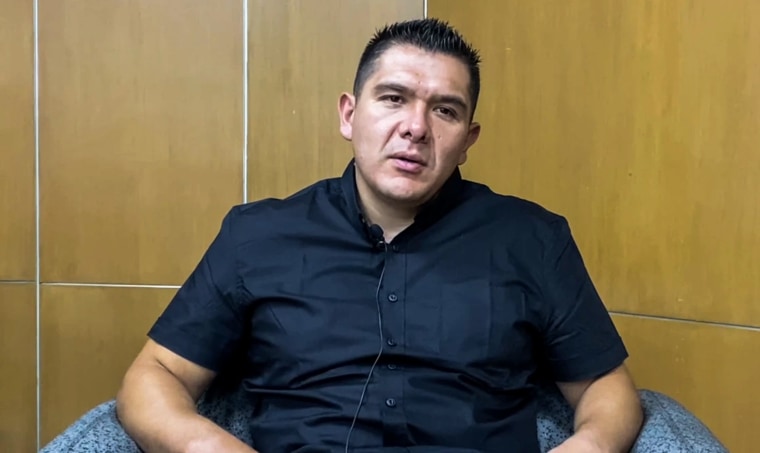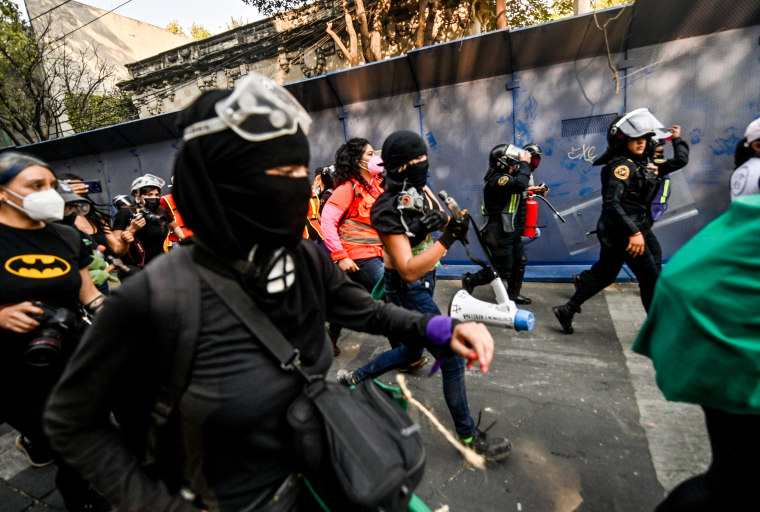[ad_1]
MEXICO CITY — Erick Razo Casales says he mastered patience during the countless hours he spent locked up in a Mexican cell subjected to multiple physical and psychological abuses.
After he was arrested in 2011, he remained behind bars for 11 years under informal preventive detention — that is, without being tried — accused of kidnapping and organized crime.
“Since I didn’t tell them anything, they beat me and began to torture me,” said Razo, who was released in the early hours of May 28. “It was 26 hours of torture,” he said in an interview with Noticias Telemundo, recalling his first days in custody. “They didn’t let me sleep for 26 hours.”
According to official documents by a United Nations human rights task force, recently released by the Mexican government, Razo Casales was severely beaten and received electric shocks to his genitals and other parts of his body. Years later, he still has intense pain in his knees, is blind from one eye and can only hear from one ear.
Human rights attorneys and groups in Mexico and abroad are denouncing what they see as widespread use of torture at the hands of law enforcement, noting that official figures don’t come close to the actual number of cases.
The topic came into focus on June 26, as the United Nations marked the International Day in Support of Victims of Torture. On that day in 1987, the U.N.’s Convention against Torture and Other Cruel, Inhuman or Degrading Treatment or Punishment entered into force; it’s been since ratified by 162 countries.
Various experts and victims agree that torture is a common practice in Mexico, despite the efforts of the current government and various judicial reforms implemented in recent years.
Razo Casales’ sister, Veronica, was also arrested in 2011 and is still incarcerated. She was sentenced to 25 years.
The Razo Casales siblings were detained by officers of the Federal Police, a body that no longer exists, in Mexico City. According to official information, on the way to the police station, the agents stopped at an unknown location where they undressed and beat Verónica Razo Casales. They allegedly tried to suffocate her, applied electric shocks on her and sexually abused her.
Once they arrived in the police station, the siblings were locked up in nearby cells so they could hear each other as they were being tortured and threatened to be killed if they did not confess to their crimes.
“One of the most serious irregularities in this case was that we were able to corroborate that the police and the prosecution, some tolerated and others carried out acts of torture,” said attorney José Luis Espejel, deputy director of the Human Rights Strategic Litigation Unit of Mexico’s Federal Defense Public Institute. “It is difficult, it is a reality that is still very painful for our country to know that the agents of the law, or those who are in charge of complying with it, commit crimes. That is, they pick up people or disappear people to torture them and produce evidence.”

The story of the Razo siblings is an example of the little influence that the U.N. has in many countries that adhere to the Convention against Torture. In 2021, the siblings’ case was analyzed by the Working Group on Arbitrary Detention, which determined that the detention was arbitrary and violated international law norms, and therefore ruled that both should be released. However, months passed before Erick managed to get out of jail and Veronica’s release is still pending.
In its report from last year, the Federal Institute of Public Defense claims to have a record of 7,779 possible cases of torture or mistreatment. From September 2019 to May 2021, there were 2,271 complaints related to acts of torture and abuse.
In 2016, a survey conducted by Mexico’s National Institute of Statistics and Geography (INEGI) among more than 64,000 inmates found almost 60% of the prison population reported some type of of physical violence upon arrest.
In August 2021, Mexican President Andrés Manuel López Obrador signed a decree ordering the release of people in prolonged preventive detention who were elderly or had been victims of torture. But an Amnesty International report last year found the decree didn’t incorporate the recommendations of civil society groups and limited the possibilities of proving that torture had taken place.
Noticias Telemundo asked Mexico’s National Human Rights Commission (CNDH) to track the complaints of torture filed in the last five years, which totaled 155. Activists and nongovernmental organizations say the figure is much higher.
“We do not see that torture has decreased, on the contrary, the cases are increasing. There is still a problem of lack of credibility in the institutions that send a message of impunity — that is why many of the cases are not even reported,” said Verónica Vázquez Mata, a lawyer for the Defense Area of the Mexican Commission for the Defense and Promotion of Human Rights (CMDPDH).
The commission is an independent civil organization that advocates for victims of human rights violations. According to its most recent data — collected from almost half a dozen human rights commissions across several Mexican states — the number of complaints filed for “torture or cruel, inhuman or degrading treatment” from January 2006 to November 2021 reached 27,486, a number that is already on a par with some of the bloodiest dictatorships on the continent, such as that of Gen. Augusto Pinochet in Chile.
However, the number of cases of torture and abuse in Mexico is expected to be much higher because, according to various academic investigations, over 93% of crimes are not reported to authorities and, of those that are, almost 95% go unpunished.
A 2015 report by the Inter-American Commission on Human Rights found that, out of thousands of complaints of torture filed since 1991, only 15 had concluded with convictions at the federal level.
‘I had never been threatened with death’
María García says that she loves to cook and she connects with herself in front of the stove, savoring flavors and breathing in the aromas of food. “We should all learn to cook, at least for ourselves, because it is an act of infinite love,” said García, a teacher at a school in Cancún where she teaches gastronomy workshops for young people.
She said nothing prepared her for what she experienced on Nov. 9, 2020, when feminist organizations and other groups mobilized to demand justice after the femicide of Bianca Alejandrina, a 20-year-old girl known as Alexis.
“Suddenly, an officer hit me very hard with a stick on my back, then put a boot on my face; he told me to shut up. Then he picked me up and punched me very hard in the eye and dragged me to the back of the Municipal Palace. As I started to scream he hit me in the ribs and that took the air out of me. Everything was in darkness and that’s when he started to touch me,” García recounted with fear in her voice.

Garcia’s case is among many included in an Amnesty International report analyzing human rights violations carried out during protests against gender violence that took place across Mexico in 2020.
“What lesson do state agents who commit torture can get if nothing happens to them?” said Olivares Ferreto, from Amnesty International. “Because nobody investigates — the government must recognize that this happens in order to design measures to eradicate this practice.”
García said the abuse “destroyed” her, as she continues to wait for justice and answers. In her head, she still hears the policeman yell, “Did you want a rampage? Well, you’ve already been worth it, b—.”
“You don’t trust anyone anymore. I don’t trust any official, anyone. They have all turned their backs on me,” she said.
‘Flawed trials’ and ‘fabrications of crimes’
Erick Razo Casales cracks a smile when he recalls that he had to wait more than a decade to eat roast chicken again, a craving he was never able to satisfy in prison.
“It seems silly — I yearned to eat chicken. Eleven years of my life were thrown away, that’s why I think the Mexican state should repair the damage it did to me,” he said.
His legal team is advising him about a possible lawsuit against the Mexican government, but his attention is focused on his sister’s release; he said he’s counting the days. In dreams he’s already hugged her and hopes to help her recover the time lost. One of his aspirations is to study law to help people who, like him, have been unjustly imprisoned.
“Seventy, 80% of the prison population is in the same situation … There are many flawed trials with the fabrication of crimes and tortured people who are imprisoned. There is a lot of injustice in the prisons of Mexico,” he said.
From prison, Verónica Razo sobs, remembering the day she found out about her brother’s release. She felt great joy, but also deep sadness to see that she’s still in prison for a crime she didn’t commit.
“I hope the Mexican state does something really strong and something real, not just for us. There are also men in other prisons who have absolutely nothing to do with certain criminal situations —while the real criminals are outside because they have money, if they have to pay and bribe,” she said from prison in Morelos.
Razo Casales said they want justice to be done.
“We are doing everything humanly possible,” he said, “to get her out of there.”
An earlier version of this story was first published in Noticias Telemundo.
Follow NBC Latino on Facebook, Twitter and Instagram.
[ad_2]
Source link













